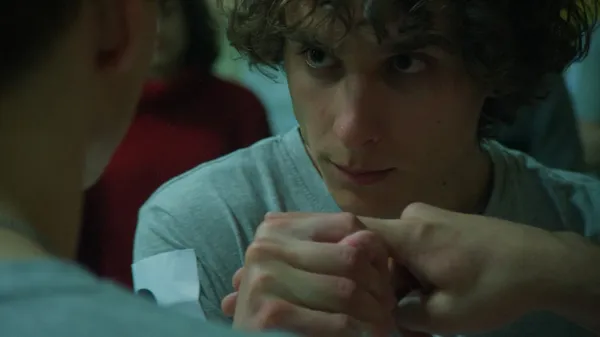Eye For Film >> Movies >> Sandbag Dam (2025) Film Review
Sandbag Dam
Reviewed by: Marko Stojiljkovic

In Croatian, the term for a sandbag dam is translatable as “rabbit dam”. What does the improvised construction for civil defence against flooding have to do with the adorable little long-eared rodents? It is still a mystery for your humble reviewer. However, in the Berlinale Generation title Sandbag Dam, co-written and directed by Čejen Černić Čanak, we are about to see a lot of both sandbags and rabbits, but neither of them are the focus of the film’s deeply felt story.
At its heart is Marko (budding actor Lav Novosel) who seems like a regular village teenager with his life and small pleasures planned for him. He is a local arm-wrestler coached by his father (Filip Šovagović) who he also helps at the mechanic garage. He is well-liked by his peers and has a stable relationship with local girl Petra (Franka Mikolaci in her first featue film role), who is accepted by his mother Vanča (Tanja Smoje), which is a big thing in smalltown Croatia. At home he spends a lot of time with his mentally challenged younger brother Fićo (Leon Grgić) and is very kind to him, nurturing the kid’s obsession with the rabbits he cares for. Marko also takes part in the village community’s collective effort of preparing for the incoming rainfall that might make the local river flood.

However, another young man comes back to the village. He is Slaven (Andrija Žunac), Marko’s neighbour and former friend who left for Berlin abruptly some time ago. The reason for his brief return is the funeral of his father, but it definitely stirs some stale village waters. In the midst of it lies a secret involving him and Marko, so the latter at first does not know how to deal with it, but as time passes, he continues to act on impulse and risking breaking up the projected image of himself he has previously kept to please others.
The nature of the secret is pretty easy to guess as we are accustomed to movies revolving around secret gay romances and flings in restrictive environments and the repressive backlash as a response to them. The plot points of such things are pretty much the same as in numerous films, also laced with the tropes typical for coming-of-age/coming out movies: internalised homophobia and the fear of the externalised manifestations of the same thing from the family members, peers and the wider environment.
Basically, here we get a crossover between, for instance, Blerta Zeqiri’s The Marriage (2017) and Luca Guadagnino’s Call Me by Your Name (2017). Sandbag Dam shares the mechanism of an expat’s return with the former and the teen milieu with the latter, but the differences are a bit more interesting, as this time we have teens and very young adults instead of “responsible”, mature people at stake (The Marriage), and not even a theoretical chance of acceptance by the immediate surroundings (Call Me by Your Name).
On the other hand, Čejen Černić Čanak, working with the script she co-wrote with Tomislav Zajec, treats us with some fine touches, developing a number of reconisable premises into a unique film. The slow-burning script leaves enough time and space for the atmosphere to be created by the means of counter-intuitively dark tones in Marko Brdar’s often restless cinematography, Julij Zornik’s sound design and through Domas Strupinskas’ pensive score. This way, she imbues Sandbag Dam with a deeply felt melancholy that never gets sappy or overly sentimental.
The filmmaker, so far best known for her shorts and the feature-length debut The Mystery Of Green Hill (2017), which was a well-received kids’ movie adapted from a popular book, now proves she can dig into some more mature topics, while maintaining her sensitivity and good work with young actors. Sandbag Dam is powered by stellar, deeply lived-in performances by the young and budding actors such as Novosel, Žunac and Mikolaci who after this film seemed destined for stardom, while the adult ones provide the necessary grounded performances in smaller roles. A quality and meaningful addition to the evolving and developing cinema of Croatia, which keeps getting more and more international recognition.
Reviewed on: 20 Feb 2025
















